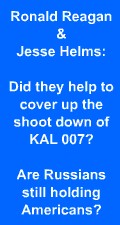Related
Article:
Other NWV
Headlines:
Senate Passes Unborn Victims of Violence Act
Book Banned In America While Troops Die For Freedom
FORMER
MARYLAND STATE SENATOR SOUNDS ALARM ON US DOLLAR
Posted: June 1, 2004
1:06 AM Eastern
by NWV Staff Writer
� 2004 NewsWithViews.com
Former Maryland State Senator Tim Ferguson is warning "the Federal Reserve is planning to destroy the U.S. economy by printing the U.S. dollar in exponentially riskier quantities until it blows off the charts and crashes, and by easing credit and rates until the average individual and corporate debt loads are so enormous that the resulting massive distortions in the economy suddenly bring on an economic heart attack, leaving no possibility of a short or even medium-term recovery."
Senator Ferguson went on to say in his recent piece published in Usury, Inc:
"That great criminal enterprise - the Federal Reserve - has accomplished step #1, trashing and ending the dollar system, culminating a multi-year, massive, insane inflation of money supply and credit....corporations such as Freddie Mac, Fannie Mae, Farmer Mac, FHA, GM, Ford, and GE (which are actually banks), worked hand-in-hand with the Bank Cartel on this sickening, twisted game, switching from pumping credit cards and cars (which have gone to zero percent financing 12 months ago) to a last-ditch horrendous push into mortgage lending.
"This insane lending will destroy the lending institutions themselves, as Ford and GM are well aware, but the elite do not care, as after this collapse, there will only be one corporation in the world, and they are all pulling together to put everyone as deep into debt as possible, to assure than no American state or corporation or region will survive when the debt mountain suffocates all life.
"This is why so many CEOs are bailing out with insane profits from questionable practices which would normally ruin their career for life, as they have raped their corporation (the latest is Grasso of the New York Stock Exchange); but they know the game is over, and it is now or never - this is their last chance to make millions and move to an island, for insiders are able to see that the economy is literally going to hell, and it will not climb out of hell in their lifetimes.
"The two great props of the deathly-sick US economy - housing and cars - are gone forever, and can no longer be used to cover up the rapidly worsening fundamentals. Indeed, many are recognizing that these two alone - especially artificially low mortgage rates - have postponed a deep crash which should have occurred 2 or 3 years ago. Sadly, this extension has not been helpful, but has served a very useful purpose for the money elite, namely, greatly deepening private and corporate debt loads, exploding red ink in state and local budgets to dangerous levels, emptying pensions, creating a fatally large and exploding US budget and trade deficit, moving millions of jobs thousands of miles away, and expanding the dollar and derivatives mountain to ensure a global panic. This has been carefully coordinated worldwide from the headquarters of all world central banks, in Basel, Switzerland."
Harvey Gordin of El Dorado Gold, a 30-year veteran of Wall Street recently warned, "Americans aren't listening to the warning signs. The debt owed by United States of America is about to spiral out of control, and there's really nothing anyone can do about it. Alan Greenspan has just warned lawmakers that the Social Security system � which currently enjoys a budget surplus that it donates to the country's general fund � will become over subscribed and begin operating in the red by the year 2008. Consequently, the influence of the Social Security surplus won't even help for much longer."
The Federal Reserve Banking system is not part of the federal government. It is a privately owned and locally controlled consortium of banks. The privately owned Federal Reserve receives no funding from Congress and issues Class A stock to a limited number of powerful families and individuals, many of them foreigners who don't live in the United States.
Historically, there has been great opposition to this private cartel of bankers:
"Some people think the Federal Reserve Banks are U.S. government institutions. They are not government institutions. They are private credit monopolies which prey upon the people of the U.S. for the benefit of themselves and their foreign and domestic swindlers and rich and predatory money lenders." Chairman Louis T. McFadden, House Banking and Currency Committee, June 10, 1932.
On May 23, 1933, Congressman, Louis T. McFadden, brought formal charges against the Board of Governors of the Federal Reserve Bank system, The Comptroller of the Currency and the Secretary of United States Treasury for numerous criminal acts, including but not limited to, conspiracy, fraud, unlawful conversion, and treason.
President Andrew Jackson, who in his first Annual Message to Congress recommended eliminating the Electoral College, undertook one of his most decisive battles which centered around the Second Bank of the United States. The Bank was a private corporation, but virtually a Government-sponsored monopoly. Immediately upon launching the first salvo, the Bank threw its power against him. Henry Clay and Daniel Webster, acting as attorneys for the Bank, led the battle in Congress. Jackson vetoed the recharter bill, charging the Bank with undue economic privilege. His views won overwhelming approval from the American voters at the time: in 1832, Jackson polled more than 56% of the popular vote and almost five times as many electoral votes as Henry Clay.
Two decades ago, current Congressman Ron Paul [R-TX] (re-elected 1997), while serving his first terms in Congress (1976-1984), began cranking up the dialogue once again on the central bank:
"Strictly speaking, it probably is not necessary for the federal government to tax anyone directly, it could simply print the money it needs. However, that would be too bold a stroke, for it would then be obvious to all what kind of counterfeiting operation the government is running. The present system of combing taxation and inflation is akin to watering the milk: too much water and the people catch on."
According to President Bush, the economy is enjoying historic growth and "her job engine is 'running strong." Bush has been crisscrossing the country in recent months assuring the American people that America is on the right track for building a strong economy and that more jobs are being created as a result of his tax cut packages.
During his campaigning, Presidential hopeful John Kerry, has been promising a plan to secure America's economic future and ensure that workers "can achieve the American dream in our changing economy by rolling back Bush's tax cuts for the wealthiest Americans so we can invest in education and health care." He also promises to create an economy that will generate 10 million jobs in his first term as President.
Americans might be somewhat confused by such opposite views on the same subject. Old timers who have lived through many booms and busts, suggest that it's a good idea for Americans to remember history. Back in 1928, leading economists were confident in their predictions about the economy and the stock market:
"I cannot help but raise a dissenting voice to statements that we are living in a fool's paradise, and that prosperity in this country must necessarily diminish and recede in the near future." - E. H. H. Simmons, President, New York Stock Exchange, January 12, 1928
"There may be a recession in stock prices, but not anything in the nature of a crash." - Irving Fisher, leading U.S. economist, New York Times, Sept. 5, 1929
"We feel that fundamentally Wall Street is sound, and that for people who can afford to pay for them outright, good stocks are cheap at these prices." - Goodbody and Company market-letter quoted in The New York Times, Friday, October 25, 1929
On October 29, 1929, the stock market crashed. Two months later, the government sought to reassure the American people: "I see nothing in the present situation that is either menacing or warrants pessimism... I have every confidence that there will be a revival of activity in the spring, and that during this coming year the country will make steady progress." - Andrew W. Mellon, U.S. Secretary of the Treasury December 31, 1929
By 1933 when FDR was inaugurated, the 'Great Depression' had taken its toll and the banking system in America had all but ceased to function. Depositors saw $140 billion dollars disappear when their banks failed. Roosevelt then closed all the banks in the United States for three days - a "bank holiday." Following these cataclysmic events, banks eventually reopened with strict limits on withdrawals.
� 2004 - NewsWithViews.com - All Rights Reserved
Sign
Up For Free E-Mail Alerts
Send comments on this article to: newseditor1@earthlink.net
"Some people think the Federal Reserve Banks are U.S. government institutions. They are not government institutions. They are private credit monopolies which prey upon the people of the U.S. for the benefit of themselves and their foreign and domestic swindlers and rich and predatory money lenders." -- Chairman Louis T. McFadden







